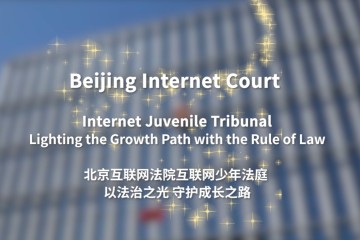BIC strives for law-based cyberspace governance with new internet judiciary
Since its establishment on Sept 9, 2018, the Beijing Internet Court (BIC), with centralized jurisdiction over 11 types of first-instance internet-related cases within the jurisdiction of Beijing's grassroots courts, has summarized and promoted new trial models, explored the formulation of new litigation rules and improved professional trial mechanisms, continuously strengthening the international discourse power and the rule-making power of China's internet judiciary.
Jiang Ying, president of the BIC, took an interview with the People's Daily Online where she introduced the BIC's efforts and progress in promoting a law-based cyberspace governance with the new model of internet judiciary.
Exploring new litigation rules with the deep integration of technology and judiciary
Over the past five years, the BIC has summarized and promoted new trial models and striven to build the digital court, so as to bring the people more convenient and efficient internet judicial services.
As introduced by Jiang, the BIC has built an online litigation platform, through which the litigants can finish all procedures of a lawsuit, from filing a case to judgment enforcement, without needing to go to the court physically.
Up to now, this green online litigation model has cumulatively reduced travel miles for litigants by 184 million kilometers, resulting in a reduction of carbon emissions by 22,000 tons. Also, it saved paper usage equivalent to the height of 556 floors and an average of expenses of 800 yuan ($109.8) per case, and reduced travel time by 16 hours per case.
To address the challenges brought by electronic evidence preservation, tampering and verification, the BIC also launched Tianping Blockchain, the country's first court-led blockchain electronic evidence platform.
Up to now, the BIC has accepted 195,000 cases and concluded 182,000 of them, with an online case hearing rate of almost 100 percent. Based on their nearly 8,000 hours of online trials, the BIC has pioneered a new set of online litigation rules, specifying for such scenarios as "not arriving at court on time", "withdrawing court half-way", and "witnesses appearing in court".
Reinforcing comprehensive cyberspace governance based on features of internet-related cases
As stipulated in the provisions of the Supreme People's Court on several issues concerning case trials by internet courts, the BIC handles 11 specific types of cases related to online civil, intellectual property, and administrative matters. These include disputes over online sales contracts, network service contracts, network infringement liability, and internet copyright ownership and infringement. The cases pose three major features, as introduced by Jiang.
First, they reflect new challenges involving emerging industries that need a judicial response, such as copyright protection in the short video industry, personal information protection and data protection in the online social networking industry.
Second, they involve new business models, in which the BIC filled the governance gap by offering judicial solutions. For example, in 2020, major video platforms in China launched the "advance screening on-demand" business model, which was protested by some users, claiming that the related service contract clauses should be invalid as they were changed after the users bought the membership. In the related case, the BIC determined that standard contracts of “one-to-many” platforms should not exclude or restrict the existing rights of consumers. The ruling protected the existing rights of users while supporting the new business model.
Third, they involve new types of rights objects. Take copyright cases for example, new types of rights objects have emerged, such as sports event animations, game live streaming recordings, short videos for live streaming sales, and emojis.
Handling internet-related cases with an "internet thinking"
A key in handling internet-related cases is to break the traditional trial mindset. Balancing the protection of individual interests and public interests is a fundamental value orientation for both legislative and judicial practices. In a "barrier-free" film copyright infringement case, the defendant claimed that the action of dubbing and adding sign language to the film involved was a reasonable usage as it was for the interest of those with hearing or visual impairments, and was thus in the public’s interest. In reality, the defendant did not restrict the audience only to those with hearing or visual impairments. The action impacted the normal usage of the film and constituted infringement to its copyright holder. The judgment of the case highlighted the legitimate interests of individuals, and achieved balance of both public and private interests.
In addressing the topic of regulating the order in cyberspace, Jiang emphasized the importance of balancing freedom and order. On the one hand, individuals should understand that freedom has its boundaries and crossing those boundaries will lead to liabilities. On the other hand, online platforms also need to have their freedom and orders clarified through judicial rulings.
The purpose of judgment is not just to settle the argument, Jiang said, but more to set the standard and clarify the boundaries for governance in order to promote sound development. In a case about a minor depositing on a soft porn platform, the BIC determined that the platform providing soft porn contents to minors was a violation of social public order and good customs, thus the service contract between the platform and the minor was invalid. The court also sent judicial suggestions to the platform regarding the loopholes found in the identification of minors and content reviewing during the case trial, which helped the platform improve its identity authentication system and the system for offering content suitable for minors.
Establishing cyberspace governance rules through judicial adjudication, enhancing governance efficiency through proactive judicial action
According to Jiang, the BIC has focused on tackling new issues in cyberspace governance, developed four major sets of rules for adjudicating intellectual property, civil, commercial and procedural cases, and formulated seven major rule systems for adjudication in such areas as digital copyright, the platform economy and digital governance. It has heard a number of typical cases that helped standardize the accumulation path of wealth online, stimulated innovation and creativity, guiding technology towards positivity and goodness, maintained judicial sovereignty in cyberspace, and effectively promoted the vigorous development of the digital economy along the track of the rule of law.
The BIC has also reinforced the protection of minors in cyberspace. Focusing on common issues found in the trials of minor-related cases, such as online depositing and tipping, opening online stores, and harmful cultural content online, the court has played an active judicial role by issuing judicial suggestions to internet platforms, achieving an amplified governance effect.
"Five years is a milestone and also a new starting point," said Jiang, who pledged to delve into advanced internet judicial rules that can further promote the prosperity of the digital economy and cyberspace governance, strive to build a world-leading internet judicial model with Chinese characteristics, and safeguard the Chinese path to modernization with high-quality judicial services.

 Judicial White Paper
Judicial White Paper
 Play
Play Play
Play Online Lawsuit Guide
Online Lawsuit Guide Beijing Internet Court Lawsuit Service WeChat Account
Beijing Internet Court Lawsuit Service WeChat Account  Beijing Internet Court WeChat Account
Beijing Internet Court WeChat Account